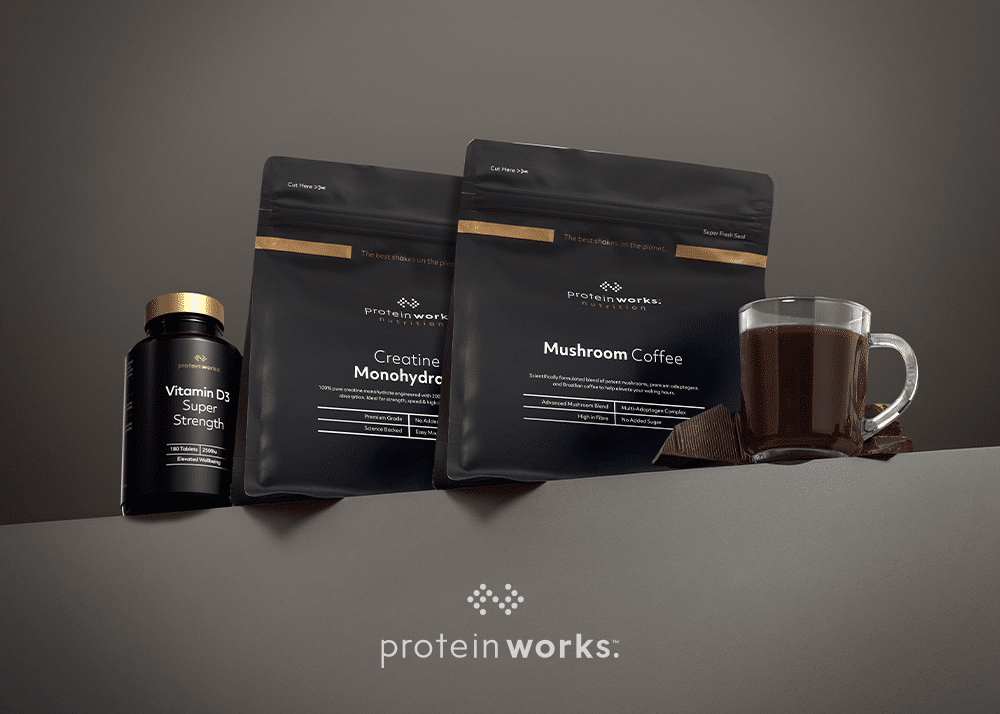
Best Supplements for Brain Health, Focus and Memory
Your brain uses more energy than any other organ in the body, relying on a steady supply of nutrients to function at its best.[1] When those needs aren’t met, it can lead to noticeable cognitive symptoms like brain fog, forgetfulness, and mental fatigue. That’s where targeted brain health supplements can make a difference.
Alongside a healthy lifestyle, the right supplements can help address these nutritional gaps, supporting everything from memory and focus to long-term brain health.
In this guide, we’ll explore the best natural supplements for brain health, the science behind how they work, and the lifestyle habits that can help you think more clearly, feel more focused, and stay mentally energised.
1. Omega-3s
Omega-3 fatty acids play a key role in brain health, particularly DHA, which makes up a large portion of the brain’s grey matter. Research shows that supplementing with omega-3 can help improve memory, learning, mental clarity, and blood flow to the brain.
Omega-3s are also anti-inflammatory and neuroprotective, helping to reduce the oxidative stress and inflammation linked to brain ageing and conditions like dementia.[2]
2. B Vitamins
B vitamins are essential for long-term brain health. They help your body produce energy, repair DNA, support methylation, and create neurotransmitters. Vitamins B6, B9 (folate) and B12 are especially important, as they help to lower homocysteine – a compound linked to memory loss and dementia.[3]
However, research suggests that these three aren’t the only important B vitamins, and that taking a full B-complex supplement may be more effective than targeting individual vitamins alone.[4]
3. Functional Mushrooms
Mushrooms contain bioactive compounds like ergothioneine and beta-glucans, which have antioxidant and anti-inflammatory effects that may support brain health. A recent systematic review of studies found that diets rich in mushrooms were linked to better mood, sharper thinking, and a lower risk of neurodegenerative diseases and depression. [5]
Lion’s mane, in particular, has shown promise in both older adults and healthy younger people, with early research suggesting it may boost mental clarity, reduce stress, and support nerve growth. In one 2023 study, a single dose of Lion’s Mane improved mental processing speed within just 60 minutes in healthy young adults.[6]
4. Ashwagandha
Traditionally used in Ayurvedic medicine, ashwagandha is best known as an adaptogen – a natural substance that helps the body manage stress. But research also points to specific brain health benefits, particularly for focus, memory, and mental clarity.[7]
In one 90-day study, stressed adults who took ashwagandha daily saw significant improvements in concentration, memory recall, sleep quality, and overall well-being, along with lower stress and cortisol levels.[8] Another study found that even a single dose could sharpen focus and enhance working memory in healthy adults.[9]
5. Vitamin D
Vitamin D helps protect the brain by reducing inflammation, supporting mood-regulating neurotransmitters like serotonin and dopamine, and maintaining healthy nerve function. Low vitamin D levels have been linked to memory issues, brain fog, low mood, and age-related cognitive decline, particularly in older adults.[10]
A large UK study even found that people with low vitamin D had a much higher risk of dementia, suggesting that up to 17% of dementia cases could be prevented by correcting the deficiency.[11]
The good news is that topping up is easy through sunlight, diet or supplements.
6. Magnesium
Known for its calming properties, magnesium plays a vital role in brain health by regulating nerve signalling and supporting the activity of GABA – the brain’s main calming neurotransmitter. It helps reduce overstimulation in the brain, easing stress and promoting mental clarity.
A study of over 2,400 older adults found that those with higher magnesium levels had better memory, sharper attention and a lower risk of cognitive decline.[12] Another review linked higher magnesium levels to better brain structure, including a larger hippocampus, which is the area of the brain responsible for learning and memory.[13]
7. Creatine
Best known for boosting physical performance, creatine also may brain health by helping produce energy in brain cells. Studies suggest it can enhance memory, focus, and processing speed, especially when the brain is under stress or working hard.[14]
A study on creatine supplementation and cognitive performance in elderly individuals found that just one week of creatine intake significantly enhanced memory and recall.[15] Other research shows it may reduce mental fatigue, making it a promising supplement for overall cognitive energy and function.[16]
Other Natural Ways to Improve Brain Health, Focus and Memory
While targeted supplements can offer valuable support, lasting brain health is built on everyday habits. Here are some natural ways to keep your brain sharp and focused:
- Eat a brain-friendly diet – Focus on whole foods rich in healthy fats (like omega-3s), antioxidants, fibre, and key micronutrients such as B vitamins, magnesium, and vitamin D. Think oily fish, nuts, seeds, leafy greens, berries, and whole grains.
- Stay hydrated – Even mild dehydration can cause fatigue, poor concentration and brain fog. Aim to sip water regularly throughout the day, especially if you’re active or drinking caffeine.
- Get plenty of sleep – Sleep is essential for memory consolidation, mental clarity and emotional regulation. Explore these tips to help you get a better night’s sleep.
- Exercise regularly – Exercise boosts blood flow to the brain, supports neuroplasticity and reduces stress, all of which help with focus and memory.
- Manage stress – Chronic stress can shrink the brain’s memory centres and trigger brain fog. Try mindfulness, meditation, spending time in nature, or simply building more rest into your daily routine.
- Stay mentally active – Reading, problem-solving, learning new skills and playing memory games can help keep your brain engaged and adaptable.
The Take Home
Whether you want to improve your memory, sharpen your focus, or lay the foundation for long-term brain health, the right supplements can make a real difference – especially when paired with healthy lifestyle habits.
For a powerful daily blend, try our “All In” A.I. Greens® – packed with brain-friendly nutrients including magnesium, B-vitamins, ashwagandha, and lion’s mane. It’s an easy way to nourish your brain and body in one scoop.
Or kickstart your mornings with our Mushroom Coffee with Lion’s Mane & Maca Root, which combines smooth Arabica coffee with functional mushrooms and adaptogens to support focus, energy, and overall wellness.
References:
[1] https://hms.harvard.edu/news-events/publications-archive/brain/sugar-brain
[2] https://pmc.ncbi.nlm.nih.gov/articles/PMC9641984/
[3] https://pubmed.ncbi.nlm.nih.gov/34432056/
[4] https://pmc.ncbi.nlm.nih.gov/articles/PMC4772032/
[5] https://www.sciencedirect.com/science/article/pii/S0149763424000162
[6] https://pmc.ncbi.nlm.nih.gov/articles/PMC10675414/
[7] https://www.mdpi.com/1999-4923/15/4/1057
[8] https://pmc.ncbi.nlm.nih.gov/articles/PMC8632422/
[9] https://pmc.ncbi.nlm.nih.gov/articles/PMC9565281/
[10] https://pmc.ncbi.nlm.nih.gov/articles/PMC6132681/
[11] https://pmc.ncbi.nlm.nih.gov/articles/PMC9348994/
[12] https://link.springer.com/article/10.1007/s00394-020-02267-4
[13] https://www.sciencedirect.com/science/article/pii/S2161831324001066
[14] https://pubmed.ncbi.nlm.nih.gov/39070254/
[15] https://pubmed.ncbi.nlm.nih.gov/17828627/
[16] https://pubmed.ncbi.nlm.nih.gov/16416332/





